Introduction
Every day, nonprofit newsrooms across the U.S. produce rigorous public service journalism that elevates diverse voices, informs communities and holds the powerful accountable.
In 2018, the newsrooms and journalists who are members of the Institute for Nonprofit News — nearly 200 news organizations — told us stories no one else was reporting and changed communities for the better. We invite you to revisit the best of those stories here, on immigration, local accountability, child welfare, education, climate change, health and health care, gun violence, criminal justice, community well-being, sexual misconduct, money and influence, world affairs, and U.S. democracy.
If you value these stories, please support the newsrooms behind them. You can find many at NewsMatch.org, where your gift to journalism will make a difference all year long.
Immigration
Immigration
After obtaining a recording of migrant children inside a U.S. Customs and Border Protection facility who were recently separated from their families at the U.S.-Mexico border, ProPublica released the audio with a story detailing the reality of the Trump administration’s family separation policy. Lawmakers and protesters alike used the sounds of children sobbing and desperately begging for their parents to condemn what was happening in facilities closed to public view. Within 48 hours of ProPublica’s story, President Trump reversed his policy, signing an executive order to keep migrant families together. A federal judge in California ordered that parents and children be reunited within 30 days. Within a month, the child heard in the recording pleading to call her aunt, a 6-year-old girl from El Salvador named Jimena, was reunited with her mother. Read the Story »
In “Kids on the Line,” Reveal from the Center for Investigative Reporting told the story of children caught up in the U.S. immigration system. After reporting exposed a shelter in Texas drugging migrant children against their will, a federal judge demanded it stop and that the children be removed quickly. After a story about a defense contractor working for Homeland Security that kept children overnight in office buildings in Phoenix, the contractor pulled the children out of the buildings and canceled his leases. Read the Story »

One-year-old Mateo Fuentes spent months without his mother or father in the United States, after his family fled violence in El Salvador and asked for asylum at the San Ysidro Port of Entry. Photo: Katie Schoolov/KPBS
Before the Trump administration’s “zero tolerance” policy brought national attention to forced family separations at the U.S.-Mexico border, KPBS was already documenting the practice, with its reporting cited in a congressional inquiry. The ongoing coverage revealed that family separations were not limited to illegal border crossings but were also occurring at legal ports of entry, contradicting the claims of senior White House officials. One story followed the journey of an asylum-seeking family from El Salvador, separated at the border in San Diego. Read the Story »
Ethiopians and Eritreans who are now living in Seattle are happy to see the end of the 20-year cold war that separated families and friends. The Seattle Globalist talked to local Ethiopian and Eritrean immigrant communities about their reactions to the treaty, and how the two countries' histories influenced those reactions. Read the Story »
Documented revealed that a pension fund for New Jersey public employees invested millions of dollars in two private prison companies that profit from immigration detention, during the height of the family separation crisis. Shortly after the story was published, the New Jersey state treasury sold over $1 million worth of stock in those companies. Read the Story »
As U.S. Customs and Border Protection has grown into the largest federal law enforcement agency, its agents have been operating deeper and deeper into the interior of the country. In The Investigative Fund’s partnership with Harper’s Magazine and The Texas Observer, reporting fellow Melissa del Bosque showed how up to 200 million Americans living within the “border zone” may be subjected to invasive searches, seizures, and detentions, including the entire state of Michigan. Read the Story »

Photo: Ivan Pierre Aguirre for The Texas Tribune
Even as migrant children separated from their parents became the focus of U.S. news media in 2018, they were often reduced to statistics: 500. A thousand. 3,000. The Texas Tribune — during those chaotic early weeks and for months after the national media had moved on to other crises — found these children and their parents and told their stories to hold the federal government accountable. Read the Story »
Against the backdrop of Trump administration immigration policy, the Rochester Beacon in New York published an essay by journalist Smitri Jacob on the long, arduous and expensive process that she and other legal immigrants face in becoming a permanent resident or U.S. citizen, and the fears they face of smaller quotas for work visas, longer waits for a green card and questions at border crossings and ports of entry. Read the Story »
Local Investigations
Local Investigations
Following a monthslong investigation into operations of the Vermont Lottery, VTDigger revealed that lottery agency owners, employees and their relatives had been winning with eyebrow-raising frequency. The governor ordered an investigation and the Legislature passed a bill requiring an independent probe. As a result, the Lottery Commission issued new rules. Among them: a ban on store owners and employees from playing instant lottery tickets at places where they work, and more frequent reviews of prizes claimed by lottery agents and their employees. Read the Story »
As part of its coverage of an ongoing political corruption case in Baltimore, Maryland Matters reported that a top-ranking Baltimore County official was a key FBI informant — and in fact had run afoul of the law himself. Read the Story »

Photo: Honolulu Civil Beat
"Are We Ready? Or Not?" — a seven-part special report by Honolulu Civil Beat, explored how vulnerable Hawaii's most populous island is if a hurricane hits, and what's being done to make residents more prepared. The stakes for Hawaii are incredibly high: A Category 4 hurricane could cause more than $43 billion in damage on Oahu and leave as many as 500 dead. Read the Story »
The Kentucky Center for Investigative Reporting chronicled a yearslong bedbug infestation and longstanding neglect in Louisville's public housing complex for the elderly and disabled. Residents there finally felt heard, and the city's housing agency acknowledged the problem, made some urgent repairs and began eradicating the bedbugs. Read the Story »
When Texas removed Planned Parenthood from its women’s healthcare programs, critics worried that the state wouldn't be able provide adequate care. The Texas Observer used public records to show that almost half of about 5,400 providers in Healthy Texas Women didn’t see a single patient in the program in fiscal year 2017. The state canceled the contract of one group found to have served less than 5 percent of the nearly 70,000 clients it promised to serve. Read the Story »
The Frontier spent months tracking down what had happened to police reports and 911 calls from a domestic violence call to the home of a powerful figure in Oklahoma politics, Preston Doerflinger. Doerflinger resigned from all of his state positions less than 18 hours after the story was published, despite being considered untouchable by many in the state. Read the Story »
The Austin Bulldog proved that a candidate for Austin City Council was lying when he claimed self-defense in a 1991 murder, for which he’d been sentenced to 20 years in prison. Before the Bulldog’s reporting, the false story had been repeated by other media, who had helped him weave a compelling personal story of redemption. Read the Story »
Sometimes one little story captures a whole town’s imagination and becomes a rallying cry. That’s what happened when East Lansing Info reported on the City of East Lansing threatening to arrest a man over his driveway. The story captured people's imagination as a tale of local government's disorganization and overreach. Read the Story »
Wausau Pilot and Review spent months reporting a $100 million public-private partnership that ultimately uncovered a startling shortcoming in the Wisconsin city's vetting process for developers receiving taxpayer-funded subsidies: Officials were not conducting even the most basic background checks to ensure their money was well spent. The development team has since defaulted on the project, leaving the city with $3 million in liens and a stalled project. The reporting led to an overhaul of the way officials vet such partners. Read the Story »
In February 2018, WHYY’s PlanPhilly reporter Catalina Jaramillo's dogged reporting on a plan to stop providing aid to Puerto Rican evacuees living in Philadelphia, effectively leaving them homeless, led FEMA to extend housing assistance. Puerto Rico’s governor took steps toward making Philadelphia a "host city" eligible for federal grants to support hundreds of Puerto Rican evacuees. Read the Story »
An analysis by Milwaukee Neighborhood News Service of more than 1 million Milwaukee Police Department dispatch records found the average response time last year for all calls was 33 minutes, including 30 minutes on average to respond to calls for domestic violence and 74 minutes to respond to one call involving a violent crime. At a public forum later, the new police chief called for more officers on every beat to help reduce response times and lessen tensions between police and the community. Read the Story »
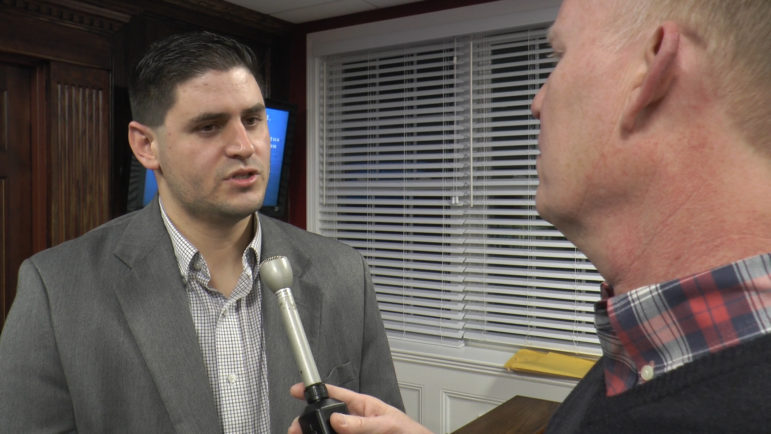
Photo Credit: The Hummel Report
"Forced Out," by The Hummel Report, makes a case that a restaurant owner in Rhode Island was put out of business by a local town councilman for political and personal reasons. The story gained statewide attention and the public fallout led to the councilman not seeking reelection and a nonprofit civil rights group suing the town and the councilman. Read the Story »
Philadelphia Public School Notebook reporter Greg Windle revealed in January that school district contractors had botched lead paint remediation efforts. Lead exposure is a major issue in many old school district buildings, which are in need of extensive repairs. The reporting prompted the city council to call a hearing and the district obtained state funding to assist with repairs. Read the Story »
WyoFile founder Rone Tempest wrote of his decade-long endeavor to bring to light a twisting tale of greed, fraud and government ineptitude and track the scandal to its conclusion in 2018 with the sentencing and incarceration of Michael J. Ruffatto — neither of which would likely have happened without his reporting. Read the Story »
Comprehensive reporting by Baltimore Brew on steadily rising spending for overtime at the Baltimore Police Department found officers making more than $200,000 a year, patrol officers earning more than the mayor, and lieutenants and sergeants making $100 an hour directing traffic at parades. The reporting helped bring a pledge to reform from City Hall. Read the Story »
After a photo of an entire high school class giving a Nazi salute surfaced on Twitter, Madison365 was one of the first outlets to verify its authenticity and the first to to locate and interview the photographer. Read the Story »
Child Welfare & Education
Child Welfare and Education
In “Moving Costs,” Chalkbeat and Bridge Magazine collaborated to expose the steep consequences of students frequently changing schools in Detroit — for students, classrooms, schools, and education policymakers in Michigan and beyond. The series has gotten policymakers and education officials talking, and an attorney has plans to cite it in an ongoing lawsuit over Detroit students' right to a quality education. Read the Story »
Reporting by The Hechinger Report exposed racial equity gaps in public university systems around the country, finding that several flagship universities that boast about their diversity and inclusion in fact are some of the most segregated while a handful of other states have quietly and consciously begun to enroll a student body that reflects the racial population of their residents, showing that the inequity is not inevitable. Read the Story »
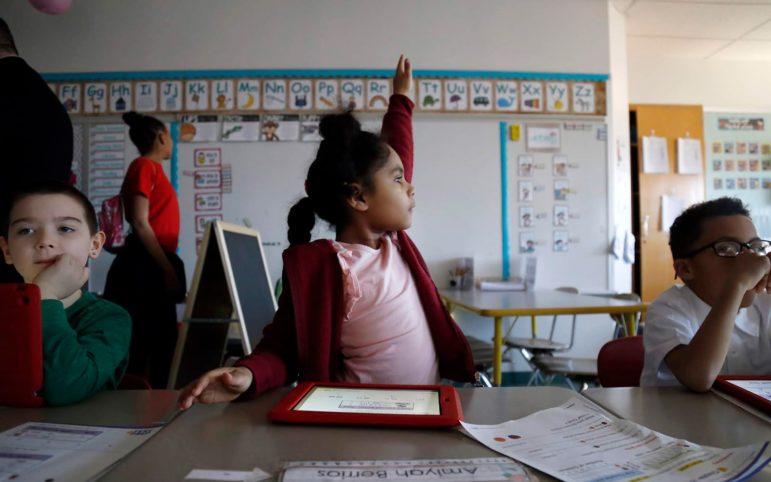
In March, Amiyah Berrios, then a first-grade student at Duquesne Elementary School in Pennsylvania, raises her hand during math class. Photo: Ryan Loew/PublicSource.
PublicSource spent months in schools around Pennsylvania to document disparities between school districts that border one another. The stories have led to financial contributions, but more importantly, groups from universities and leadership programs have pored over the series and visited the schools profiled to see them firsthand. Following the reporting, the state education secretary visited to talk with local administration officials about potential solutions to disparities. Read the Story »
Oklahoma Watch revealed that dozens of private schools fail to include disabled students in their policies against discrimination in admissions as required by law because they offer scholarships funded by state income tax credits. The story led the state’s largest tax-credit scholarship fund to order at least 60 schools to comply or be removed from the program. Read the Story »
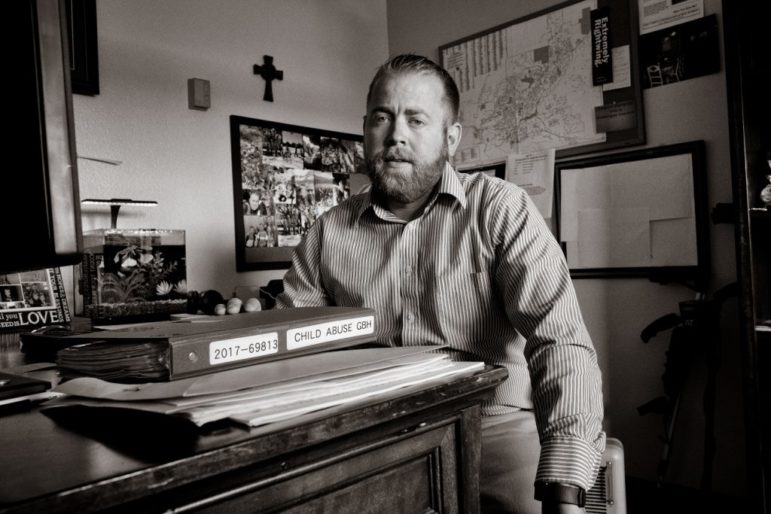
Detective Chris Blea of the Farmington Police Department. Photo: Don Usner/Searchlight New Mexico.
A four-month investigation by Searchlight New Mexico uncovered a pattern of abuses within New Mexico's treatment foster care system — a branch run by nonprofit and for-profit companies to serve the most traumatized children in state custody. The reporting found at least 28 specific violations of oversight rules and led to a state investigation. Read the Story »
The most extensive overhaul of federal education policy in nearly two decades includes mandates meant to give students in foster care a chance at “educational stability.” But according to a nationwide analysis by The Chronicle of Social Change, many states struggle to meet the law’s requirements. The stories helped states and schools understand how to make the law work for their most disadvantaged students. Read the Story »
Reporter Jackie Valley of The Nevada Independent spent the 2017-2018 academic year embedded in a struggling Las Vegas school in one of the five largest school districts in the country. Her five-part series uncovered student stories of fractured families, frequent moves or homelessness, lack of food and neighborhood violence, showing how these social issues can ripple through a school and create a challenging and sometimes heartbreaking environment. Read the Story »
A brash civil rights attorney blustered into a teaching position at a rural California high school that served mostly the children of farm workers back in 1986. He convinced the senior class that they could attend the best private universities in the country. Despite their spotty high school academic records, dozens of them graduated from those universities with honors — and the teacher was fired. Voices of Monterey Bay caught up with many of those graduates, who are now turning 50, for a story about chasing improbable dreams. Read the Story »
IowaWatch showed that nine of every 10 public school districts in Iowa have buildings within 2,000 feet of farm fields where pesticides get sprayed, a potential risk some school leaders were unaware of. For the story, reporters collaborated with journalists at the University of Northern Iowa and student reporters in IowaWatch’s nationally recognized high school journalism program. Read the Story »
Block Club Chicago spent months examining how gentrification affects public schools in Logan Square, a neighborhood that has been home to Hispanic families for decades. As the neighborhood's Hispanic population dwindles, they're running out of kids to teach. Read the Story »
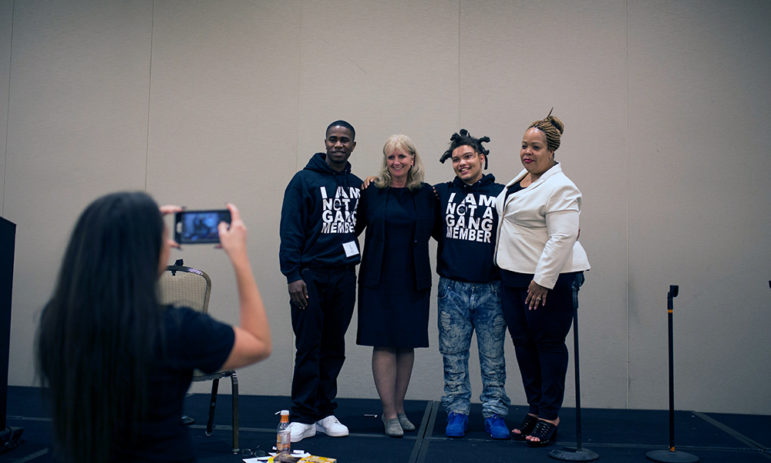
Jaleel Everson, Caren Harp, DeQuan Franks, and TeNeane Bradford pose at the Coalition for Juvenile Justice conference. Photo: Clarissa Sosin for JJIE.
The Juvenile Justice Information Exchange at the Center for Sustainable Journalism was the only news organization to cover a contentious press conference in June by the Trump administration's new head of the Office of Juvenile Justice and Delinquency Prevention, where public safety was emphasized over efforts to reduce to racial disparities. National organizations value the coverage of a topic that many other news organizations ignore. Read the Story »
In a monthslong investigation, California Health Report found that the state’s key program for providing mental health treatment to low-income children and youth serves just a fraction of those estimated to need help. As a result, many children in need of mental health services don’t get treatment, or suffer for years before being diagnosed. Read the Story »
New Mexico In Depth traveled to isolated areas of New Mexico to showcase how those communities were expanding access to early childhood education and care for their students. The newly elected governor’s administration has made universal pre-K one of its primary goals, and this series shows both the obstacles and solutions happening in the state. Read the Story »
A five-month investigation by WitnessLA exposed a badly flawed system for youth held in Los Angeles County’s juvenile camps and juvenile halls to report mistreatment by a staff member or another young person. The story led to pressure to fix the grievance system and has been repeatedly cited by community members and officials as an example of why Los Angeles County Probation needs civilian oversight with investigative powers. Read the Story »
Learning is extra challenging for students in some New York City classrooms who must deal with teacher absences, long-term teacher attrition and principals' inability to fill staff slots. Patrick Donachie's five-part series for City Limits explored the nuanced causes and manifold consequences of inconsistent access to any certified instructor — high quality or low. Read the Story »
Climate Change
Climate Change
Reporting by Yale Environment 360 showed how as wildfires become more frequent and destructive in a warming world, they are increasingly leaving in their wake debris and toxic runoff that are polluting rivers and fouling water supplies for millions of people. Read the Story »
The Pulitzer Center on Crisis Reporting made a significant investment in climate change reporting in 2018, including “Losing Earth,” a special edition of The New York Times Magazine that told the story of our collective failure to address the crisis, a series for PBS NewsHour and PRI’s The World about Amazon deforestation, and the podcast Threshold looking at climate change in the Arctic, among other projects. This work on climate change culminated with the announcement of the Rainforest Journalism Fund, one of the largest investments ever made in journalism covering rainforest issues. Read the Story »
In a five-part series, The Highlands Current examined the effects of climate change on the Hudson Highlands, including on farming, the rising level of the Hudson River and train access to New York City, disappearing wildlife, and the incidence of Lyme disease. The reporting relied on the many scientists and advocates who happen to live in the area and are addressing various aspects of the problem. Read the Story »
Delaware Currents illuminated the pushes and pulls on the Delaware River watershed in this era of climate change with an in-depth profile of one small borough. Once home to a refinery and now a natural gas hub and the destination of two controversial pipelines, its fortunes have been inextricably tied to the energy industry throughout its history. Read the Story »
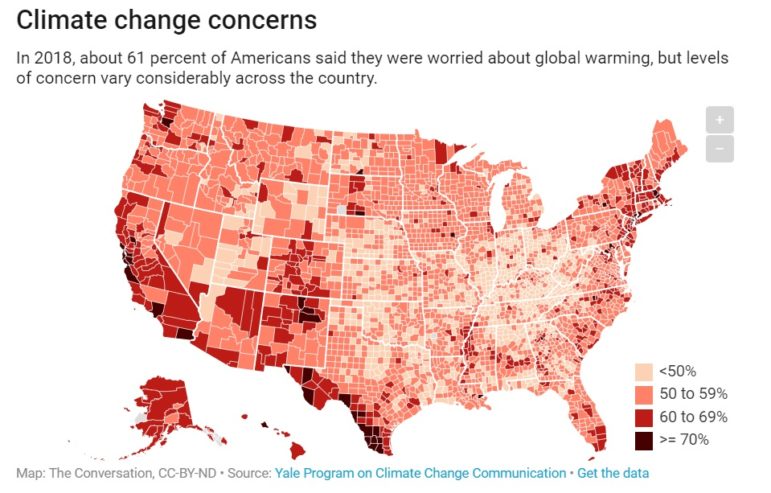
Map: The Conversation, CC-BY-ND Source: Yale Program on Climate Change Communication
The Conversation US unpacked what climate change means for the U.S. with a special day of interdisciplinary coverage — from warming being the “new normal” in Alaska to how climate science is taught (or not) in high school, based on the research of scholars from 11 universities. Read the Story »
Policy wonks aren’t solving climate change, so the most-impacted communities are coming together to do it themselves. Southerly, Scalawag and the Montgomery Advertiser partnered to share their stories in a series about people in the South using the community organizing and leadership lessons of the civil rights movement to push back against exploitative industries. The series connected activists across the region and gave organizers the tools they need to advocate for change in the halls of power. Read the Story »
Health & Health Care
Health and Health Care
South Dakota News Watch showed how major rivers across the state have become dumping grounds for billions of gallons of human, agricultural and industrial wastes each year under a state-sanctioned permit and inspection program that is outdated and understaffed. The “Rivers at Risk” series pushed water quality and inspection deficiencies onto the agenda for gubernatorial debates. Read the Story »
Stephanie Mencimer’s investigation for Mother Jones of the link between alcohol and breast cancer, and industry's efforts to bury it, fueled by her own reckoning with drinking and disease, had enormous resonance especially with women. Even now, months after publication, the newsroom regularly hears from women who have been jolted by the story into questioning their habits. Read the Story »

G. Ford Gilbert, founder and CEO of Trina Health, at the company’s Sacramento headquarters on Feb. 5, 2018. Photo: Megan Wood/inewsource.
inewsource spent months investigating a California lawyer, his national network of Trina Health clinics and his promotion of what he called a “miraculous” procedure for reversing the complications of diabetes. Experts called it a scam, and the lawyer was charged with attempting to bribe Alabama lawmakers to try to get legislation to force insurance companies to cover the treatment. Read the Story »
A database of state records built by the Connecticut Health I-Team identified 133 cases involving nurses disciplined for using opioids, including oxycodone, morphine, heroin and fentanyl. The story, including interviews with two nurses who lost their licenses to drug addiction, raised awareness of the issue and the dilemma regulators face in deciding when state licenses should be reinstated. Read the Story »
In 2015, North Carolina's legislature passed a law mandating that insurers cover expensive treatments for children with autism, but more than two years later, that promise had yet to be fulfilled for many families. After NC Health News reported and ran this pair of stories, state health officials pressed local mental health management to start serving these children. Read the Story »
The Economic Hardship Reporting Project assigned Michael Graff to conduct a postmortem on one of 83 rural U.S. hospitals that have gone out of business since 2010. In the story, Graff recounts the desperate quest to save the life of Portia "Po" Gibbs, 49, who died of a heart attack six days after her local ER closed amid consolidation in the hospital industry. Read the Story »
The Arkansas Nonprofit News Network uncovered extensive flaws in Arkansas’ first-in-the-nation Medicaid work reporting requirements. The culmination of a yearlong examination of the state’s unique version of Medicaid expansion, the report told the story of two working beneficiaries struggling to navigate a bureaucratic maze and regain their health insurance after the Arkansas Department of Human Services locked them out of coverage. Read the Story »
In New Haven, a wave of 100 drug overdoses became an international story but remained misunderstood locally, where the community had to deal with the fallout. After documenting the events in real-time, the New Haven Independent got to the bottom of how a variant of synthetic marijuana had changed the local drug scene and identified a set of new policy options that became the subject of public debate and action. Read the Story »
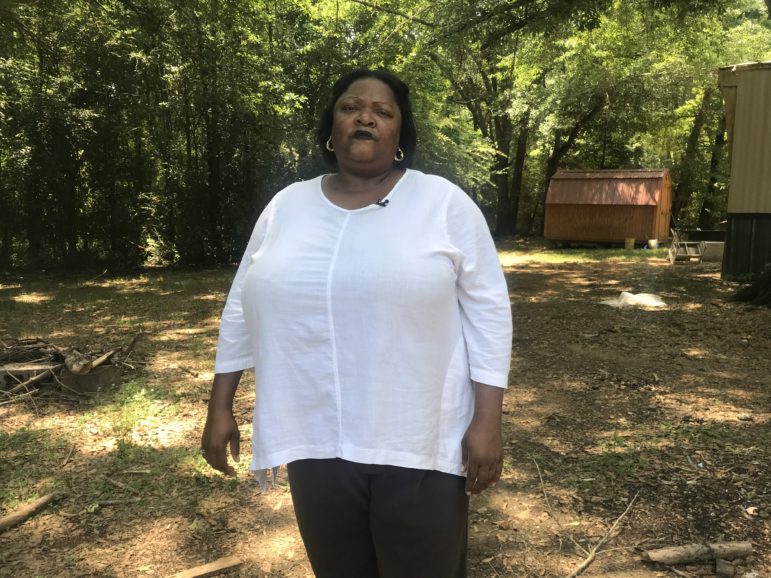
Because she can't afford a septic tank, Pamela Rush's wastewater flows out into her yard in rural Alabama through a process called “straight-piping.” Rush says she believes it has led to health problems for her children. Photo: Clancy Calkins for Southerly.
Months of reporting by Southerly shed light on the rise of poverty-related neglected tropical diseases, particularly hookworm, in the rural American South related to a lack of proper sewage infrastructure. The reporting, co-published with Montgomery Advertiser and Scalawag, led to a community event in Lowndes County, Alabama, and a civil rights lawsuit filed against local and state health departments. Read the Story »
Tarbell revealed the Trump administration, at the behest of the deep-pocketed pharmaceutical lobby, is preventing the shipment of cheap, safe, legally purchased prescription drugs from online pharmacies. Read the Story »
Nearly 6,000 babies born in Maine in the past five years were addicted to opiates and other drugs. A series of stories by the The Maine Center for Public Interest Reporting examined the suffering that resulted and the strain on state hospitals and other resources, spurring action by legislators, the governor-elect and two of Maine's congressional representatives. Read the Story »
The Reporters Inc. showed how the growing personal care assistance shortage in Minnesota has approached a crisis level and raised concerns about the safety, health and independence of many disabled people. Read the Story »
Gun Violence & Criminal Justice
Gun Violence and Criminal Justice
In the wake of the Parkland school massacre, the Florida Bulldog revealed that the state had offered tax breaks to a U.S. manufacturing affiliate of the Russian company whose Kalashnikov AK-47 assault rifle was subject to U.S. sanctions. A federal grand jury in Miami has subpoenaed state records about the deal. Read the Story »
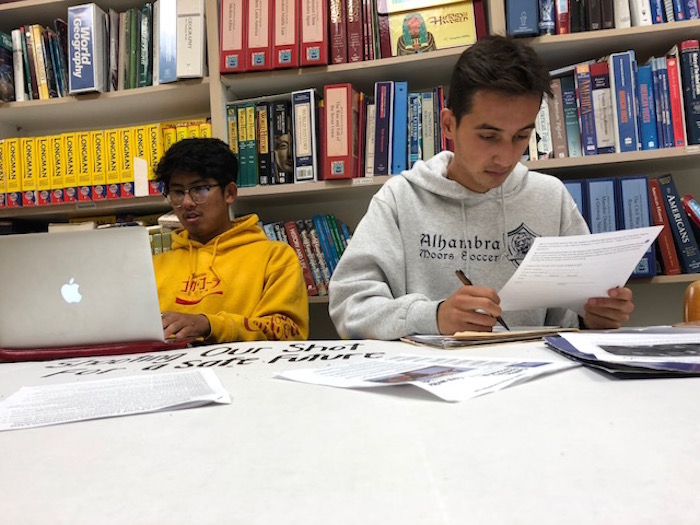
Sujit Gurung and Eduardo Flores work on a gun control resolution as part of Jose Sanchez's 3rd period American government class at Alhambra High School. Photo by Jose Sanchez/Alhambra Source.
In response to the February 2018 Parkland, Florida, school shooting, a group of Alhambra High School students wrote a resolution to address gun violence locally. Alhambra Source's coverage gave the students a platform, and Rep. Judy Chu, D-California, presented a resolution based on the students' work to Congress in September. This story showed the importance of community reporting and how seemingly "small stories" and efforts can scale up to issues of national importance. Read the Story »
A yearlong investigation by The Trace exposed the depths of the National Rifle Association's control over politicians in Florida, where legislators ceded lawmaking powers to the group's lobbyist. Days after the story was co-published with the New Yorker in March, more than 60 Florida Republicans broke with the NRA to pass an unprecedented gun safety package. Read the Story »

Credit: Better Government Association
The Better Government Association and WBEZ exposed a big loophole in how police shootings in Chicago's suburbs are handled. The report resulted in a law requiring all police shootings in the state to prompt an internal review for policy violations or procedural mistakes, and the Cook County sheriff offered to help the county’s suburban police departments conduct administrative investigations. Read the Story »
Mississippi Today used a records request to show that August was the deadliest month for Mississippi prisoners in five years. Though Mississippi Today was not alone in reporting the spike of inmate deaths while in the state’s custody, its reporting answered key questions and brought to light new information. Subsequently, state prison officials asked the FBI to investigate. The Mississippi Legislature was expected in 2019 to debate calls for more accountability and funding. Read the Story »
The New Hampshire Center for Public Interest Journalism's investigative reporting exposed serious flaws in the state's policy of keeping secret the names of police officers disciplined for being dishonest. The reporting earned the center lead plaintiff status in a Superior Court case recently filed with other news media and the state ACLU against the New Hampshire attorney general seeking the unredacted list naming 171 disciplined officers. Read the Story »
The Marshall Project teamed up with the USA Today Network in Tennessee to expose how a 150-year-old law allows county jails to ship people to solitary confinement in a distant prison before they'd even been convicted of a crime. In May, Tennessee Gov. Bill Haslam signed a law prohibiting jail officials from holding teenagers in state solitary confinement while awaiting trial. “We don't always think that the media are the most helpful folks in the world,” Haslam said a few days after the story was published, “but there are times — a lot of times — when an issue comes up that you don't know about. One of those was this.” Read the Story »
Stories by BenitoLink about one woman’s lawsuit against San Benito County, California, alleging civil rights violations and wrongful death illuminated an underlying issue: local residents’ concerns that they’ll be targeted if they reveal mistakes made by police or sheriff's departments. Since BenitoLink published these stories, the sheriff has made himself unavailable to reporters and both the sheriff’s department and police officer ignore emails on simple crime and accident stories when it does not benefit them. Read the Story »
Massachusetts law calls for immediate services and monetary compensation for wrongly convicted men and women. But an investigation by the New England Center for Investigative Reporting for WGBH found the state provided no support to a man whose conviction was thrown out by a judge after 38 years behind bars. The reporting led to pledges of reform by the state's attorney general. Read the Story »
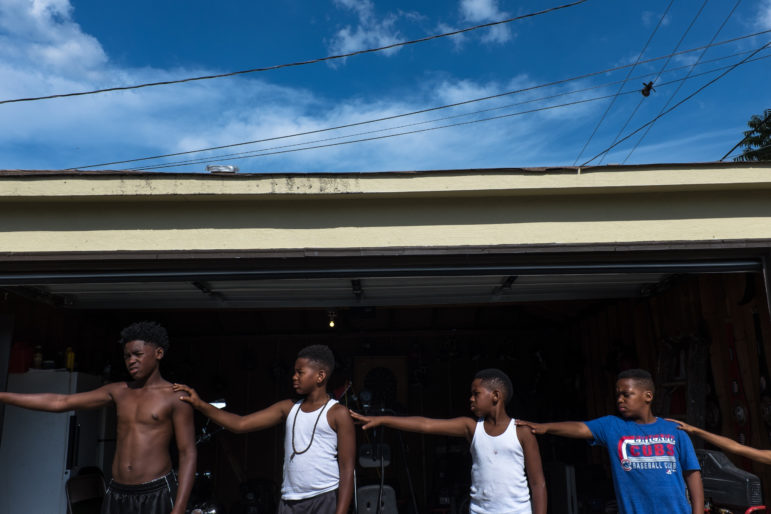
Members of the North Lawndale Boxing League line up arm-lengths apart before practice. Photo: Sebastián Hidalgo for City Bureau.
City Bureau reporters followed the opening of the nation's first restorative justice court, on Chicago's West Side. The yearlong project involved over 100 interviews, 10 stories, two live events and one journalism award, bringing an unprecedented amount of transparency and community input on an experimental and opaque court system. Read the Story »
The Investigative Reporting Workshop found deep cracks in the registry system for sex offenders that allow predators to move, skip registration, and begin new lives under the radar in a new neighborhood — unless they are arrested again. The story was published with IowaWatch. Read the Story »
The Chicago Reporter analyzed years of data and found a troubling pattern of Chicago police officers charging people they’ve assaulted with spurious “cover charges,” such as resisting arrest, to justify their excessive use of force. The investigation also highlighted the Cook County state’s attorney’s office’s role in supporting such claims. Read the Story »
The Crime Report spent two months investigating the systematic targeting of pain doctors considered by the federal government to be the driving forces behind the nation's opioid crisis. The reporters created a database with 15 years of conviction data and identified 263 doctors who were imprisoned and several thousand who lost their licenses. Additional interviews suggested that the crackdown did little to address the real roots of the crisis. Read the Story »
Community Well-being
Community Well-being
Ten months of reporting for "Just Green Enough" by Bay Nature reporter Pendarvis Harshaw showed how gentrification can occur under the mantle of creating parks or cleaning up environmental pollution in poor neighborhoods, a phenomenon that could increase with the passage of California’s Proposition 68 as it supplies $725 million to build parks in underserved neighborhoods. Read the Story »
Private groups traditionally have provided the "margin of excellence" for national parks. But National Parks Traveler found that the National Park System's $11.6 billion maintenance backlog has many such “friends” groups instead funding critical park projects traditionally paid for through its budget. Read the Story »
Anthropocene Magazine tested out a provocative idea: Could personal food computers in which people grow their own fruits and vegetables be the harbingers of a massively distributed farming system that reduces fertilizers, pesticides, and waste? Read the Story »
The Connecticut Mirror explored the impact of the grinding poverty that exists in the wealthiest state in the wealthiest country on earth. One of the state’s U.S. senators tweeted after reading one of the stories in the series: "If you live in Connecticut and read only one thing today, make it this. Upends some Nutmeg State conventional wisdom.” Read the Story »
As part of its yearlong, in-depth Rural Agriculture and Environment Project, Civil Eats published a deeply reported feature by Siena Chrisman that explored the collapse of farm economies, how it's affecting communities and the nation, and who is working on solutions. "Is the Second Farm Crisis Upon Us?" inspired farmers, foodies and policymakers from coast to heartland to coast to add their voices to the conversation. Read the Story » Project »
Combining science, gripping narrative and striking visuals, Ensia’s reporting in “Here Come the Megacities” is helping urban areas around the world recognize the challenges facing them and identify early on strategies for maximizing the benefits and minimizing downsides of unprecedented growth. Read the Story »
ecoRI News has covered the contentious issue of solar siting in Rhode Island, where forest is being cleared to make room for utility-scale solar projects. The debate has divided the environmental community and pitted environmentalists against renewable-energy proponents. The reporting led to a larger conversation about solar siting in the state, and a stakeholder group is working on a comprehensive plan to address industrial-scale solar-siting issues. Read the Story »
Digging behind the headlines of a corruption trial, BirminghamWatch found the vast majority of the local region’s major sources of pollution are located in low-income areas whose residents are largely African-American. The reporting continues to inform the on-going dispute over how promptly the North Birmingham area will be cleaned up, whether industries will pay, and whether former Alabama environment agency officials broke the law in resisting remedies. Read the Story »
More than 14 clergy members from various faith traditions gathered in Newark, New Jersey, to learn how electric vehicles and chargers could transform local neighborhoods and to bless the use of electric vehicles. CivicStory filmed the ceremony and captured — in short video form — a new urgency about shifting to cleaner transportation in urban neighborhoods. Read the Story »

Seattle has been the fastest-growing big city of this decade, and growth is harming the tree canopy. Photo: Annica Crouse Holder/InvestigateWest
InvestigateWest laid bare the inadequacy of the tree-protection ordinance in Seattle, the decade's fastest-growing big city in the U.S. When a supposedly stricter replacement was proposed, InvestigateWest’s reporting revealed its inadequacies and it was withdrawn to be strengthened. Read the Story »
“Genetic Testing Goes Mainstream,” a yearlong investigation by Science News, uncovered the deeply flawed science and real risks behind the direct-to-consumer genetic testing craze. The reporting makes clear the limits of the technology and explains how to make the most of the results while protecting your privacy. Read the Story »
Hidden City Daily writer Ann de Forest traveled to Italy to trace the architectural inspiration for an 1891 church demolished in Philadelphia because of an error by the Philadelphia Historical Commission. Rampant church demolitions are part of a preservation crisis in the city, once a leader in protecting landmark buildings. Read the Story »
A 1,200 acre property was slated to become the largest planned community in Albemarle County, Virginia, before the Great Recession hit. Charlottesville Tomorrow reporters explored how turning this site into a $42 million state park integrates with the region’s bike and pedestrian plans. Read the Story »
Fifty years ago, New Orleans razed a thriving African-American business corridor to construct an elevated expressway. Next City dug into how the Claiborne Corridor community has reimagined the space below as a hub of culture, commerce and play, taking a stand against the historical ravages of "urban renewal." Read the Story »
A two-part series by Northern Kentucky Tribune shed light on income inequality in a Kentucky county where the gap between the haves and have-nots is the highest in the state and the top 1 percent makes 21.9 times more than everyone else. Read the Story »
#MeToo
#MeToo
Voice of San Diego spent months reporting on sexual misconduct by teachers and other public school employees, and in several cases has gone to court to secure records documenting those abuses from schools or individuals that tried to shield them from public view. Many of the records establish a pattern that goes beyond individual schools and districts, in which school officials allow misbehaving employees to quietly resign or transfer — sometimes with cash payouts and glowing recommendations — ensuring they can continue working with kids. Read the Story »
Current’s coverage of allegations of sexual harassment within NPR News found that one of its most celebrated reporters had resigned from the news organization after an internal investigation of complaints against him. The story provided a detailed account of what one source described as an “NPR-style predation” targeting young female journalists, including interns seeking career advice, over decades. It prompted a #MeToo disclosure by another woman and ensured that the real reasons for his departure were publicly disclosed. Read the Story »

Courtesy of Grist
Members of the inaugural class of Homeward Bound, an effort to build a network of 1,000 women leaders in science by 2026, reached out to Grist to share a disturbing irony: Throughout the yearlong program designed to empower female scientists several women reported incidents of bullying, sexual harassment, and in one instance, what a participant labeled "sexual coercion." The story explored what happened and offered a path forward for fixing the program — and helping it fulfill its intended goal. Read the Story »
Tucson Sentinel's extensive reporting on an Arizona congressional candidate's failed attempt to cover up a sexual assault allegation, as well as his error-laden Federal Election Commission filings and a chaotic, confrontational news conference, led to numerous Democratic organizations disavowing any connection with him, and prompted numerous deep-reaching #MeToo conversations locally. Read the Story »
Months of reporting from MinnPost culminated in a detailed expose of sexual harassment and misconduct by a top aide to Rep. Rick Nolan, one of Minnesota’s most prominent Democratic politicians. The investigation revealed not only the harassment of three young women, but the systemic mishandling of their allegations by the congressman and his senior staff. The story resulted in widespread criticism of Nolan and prompted increased scrutiny during his failed run for lieutenant governor. Read the Story »
Money, Power & Influence
Money, Power and Influence
The Lens uncovered a scheme to place paid actors at New Orleans City Council meetings to give the impression of community support for a power plant. The reporting triggered an investigation of the city's power utility, Entergy New Orleans, which faced a $5 million fine. Read the Story »
The New Food Economy revealed that Amazon was a top employer of food stamp recipients across the nation. After the reporting was published, Sen. Bernie Sanders introduced a bill to hold the company accountable for its burden on taxpayers. Shortly after that, Amazon raised its minimum wage to $15 an hour, a change that impacted hundreds of thousands of employees. The story was published in partnership with The Intercept. Read the Story »
PassBlue obtained the 2017 financial disclosure forms of then-U.S. Ambassador to the United Nations Nikki Haley, showing that she and her husband were in debt for up to $2 million as of January 2018. Reporting further showed that her husband had sold a family property later in 2018, worth about $1.1 million. Part 1 » Part 2 »
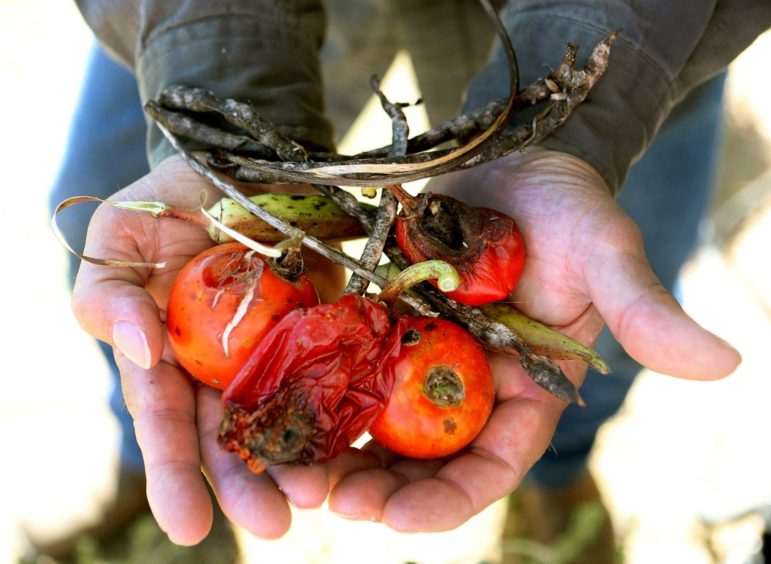
Sharon and Kelvin Dordon, who farm in Bernie, Missouri, say this is what dicamba, which drifted from neighboring farms, did to their crops. Photo by Karen Pulfer Focht/Food & Environment Reporting Network.
The Food & Environment Reporting Network, in collaboration with Reveal, documented how the EPA for years ignored scientific evidence that the herbicide dicamba was prone to drift onto nearby fields and kill non-GMO crops that weren’t designed to resist it. This story — relying on documents obtained in public records requests and lawsuits — showed that scientists had repeatedly warned the EPA about the dangers of the volatile herbicide and the degree to which industry influenced a government agency. Read the Story »
A deep-dive investigation into Medicaid by the Center for Public Integrity and NPR exposed how the pharmaceutical industry has infiltrated nearly every part of the often-opaque process that determines how drugs will be covered by taxpayers. The project has prompted action in Arizona, Texas, Colorado and New York, including a firing, two resignations, a call for a criminal investigation and tighter conflict-of-interest rules. Read the Story »
“Cashing in on Standing Rock” by High Country News told how a nonprofit “squandered” $1.4 million raised around the #NoDAPL pipeline protests in North Dakota in 2017. This nine-month investigation also looked at nearly 250 fundraising campaigns, many of which accepted money without necessarily offering accountability to donors or the causes they claimed to represent. Read the Story »
The Midwest Center for Investigative Reporting highlighted the backdoor conversations between the agribusiness company Monsanto and federal and state EPA officials on changes to the use label of a pesticide — a version of which was made by Monsanto — that caused damage to millions of acres of crops in 2017 and 2018. Read the Story »
After the U.S. Energy Department proposed a new rule to subsidize struggling coal and nuclear power plants — estimated to cost ratepayers billions — In These Times published exclusive photos showing an undisclosed prior meeting between Energy Secretary Rick Perry and coal CEO Robert Murray, at which Murray handed Perry a similar proposal. The article led the Federal Energy Regulatory Commission to delay its rulemaking and to ultimately reject the proposal in January 2018, and resulted in a federal lawsuit. Read the Story »
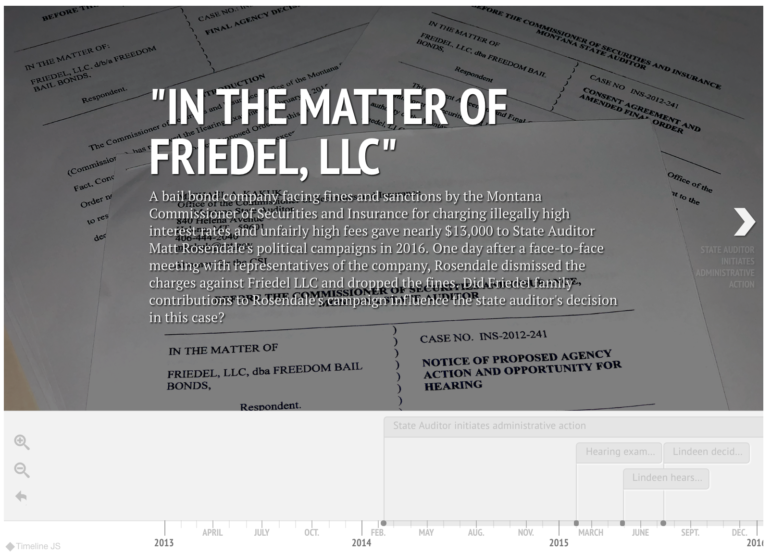
Courtesy of Montana Free Press
Montana Free Press discovered that a Republican nominee for the U.S. Senate took nearly $13,000 in campaign contributions from a bail bond company facing sanctions by his office. One day after a face-to-face meeting with the contributors who were principals in the company, State Auditor Matt Rosendale dropped the fines and sanctions against the company. Read the Story »
The Forward worked for three years to discover the funding sources of Canary Mission, an online blacklist of students critical of Israel, publishing a series of stories revealing specific donors. In response, donors and foundations promised to no longer support the blacklist, and mainstream Jewish federations are being questioned about their responsibility to check beneficiaries of their donor advised funds. Read the Story »
MuckRock published a transparency postmortem of the #AmazonHQ2 bid process, finding that only 82 of the 238 known bids were released. The project, which took more than a year of reporting and over 200 public records requests, made the bids available to activists and journalists and broke down the ways municipalities conspired with the company to keep the process hidden from public view. Read the Story »
FairWarning published a powerful examination of the decision by Congress to exempt small farms from oversight by the Occupational Safety and Health Administration. As a result of this unique form of immunity, many hundreds of farm employees have been killed or badly injured on small farms without any follow-up investigations by OSHA. Read the Story »
We, the People
We, the People
The Colorado Independent spent years following the case against Sir Mario Owens, whose death sentence was upheld even after the judge found a pattern of prosecutors withholding exculpatory evidence. The Independent fought to unseal those records, resulting in a state Supreme Court decision making Colorado the only state without presumed First Amendment access to judicial records. Now nearly every major American news outlet has signed on to amicus briefs in support of a petition to the U.S. Supreme Court, which has ordered the state to justify its decision. The irregularities in death penalty cases reported by The Independent have fueled a growing movement to overturn capital punishment in Colorado. Read the Story »
The Center for Responsive Politics uncovered spending by a Robert Mercer-backed secretive group that worked with Facebook and Google to target anti-Muslim ads at swing voters in critical Senate races and the campaign for the White House. Read the Story »
Bridge Magazine’s monthslong probe of court, tax and email records documented how a shadow nonprofit front group backed by business interests worked with sitting politicians to gerrymander Michigan and solidify political majorities for a full decade. In November, Michigan voters overwhelmingly passed a ballot proposal to take redistricting out of politicians’ hands. Read the Story »
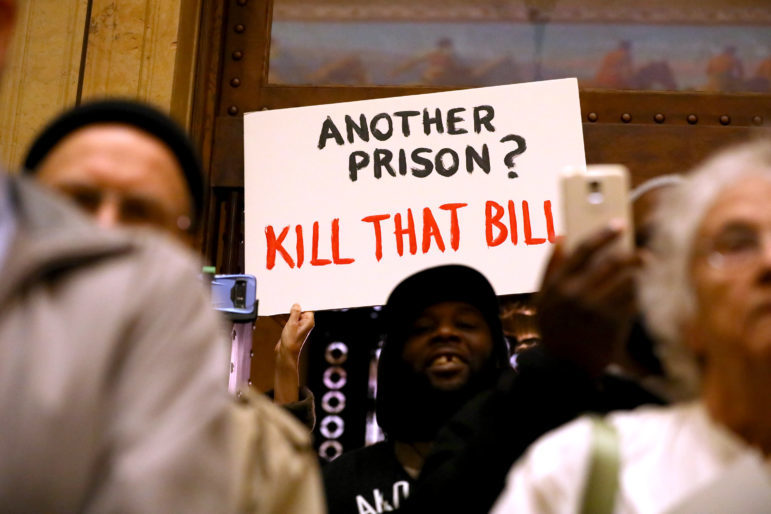
A group of citizens gathered at the Wisconsin State Capitol on March 13, 2018, to protest the inclusion of a $350 million prison on a bill that would have made unrelated changes to Department of Corrections’ policy on probation and parole. The Senate declined to take up the bill. Photo: Coburn Dukehart/Wisconsin Center for Investigative Journalism
The Wisconsin Center for Investigative Journalism, as part of its “Undemocratic” series, exposed the tricks used by the Legislature to sneak in unpopular legislation and keep the public in the dark. The story put into context legislative maneuvers — such as last-minute and anonymous budget amendments — that have transformed or greatly affected the lives of hundreds of thousands of Wisconsin residents. Read the Story »
Historically voters in Cook County, Illinois, skipped over the bottom of the ballot decisions about whether a list of judges should be retained in office. Injustice Watch set out to address that situation, publishing a series of articles on the most noteworthy judges, and then a detailed guide for voters. Matthew Coghlan, the subject of the first article, became the first county judge to lose a retention race since 1990. A far greater percentage of voters cast votes in the retention races, and many wrote notes crediting the knowledge they received from the guide. Read the Story »
A Latino USA story from Futuro Media on Santa Fe’s nearly century-old Entrada pageant contributed to negotiation to end the annual event, which honored a Spanish conquistador known for reclaiming Santa Fe from the Native American Pueblo people. The event had led to escalating protests by the Native American community in recent years, but a Pueblo activist featured in the story said she felt it was the first time her community was heard. Read the Story »
InsideClimate News showed how a multi-pronged attack is underway to choke off one of the most effective tools of the modern environmental movement: the environmental protest. Bearing the bruises of activists’ successes, especially in delaying new pipelines, powerful industries and their allies are using legislation and the courts to try to undermine protections for free expression promised under the First Amendment. Read the Story »

Maddie Snyder, right, needed help updating her name and gender markers on her driver's license after she came out as a trans woman. Hannah Morris, left, got to work. Photo: Jamie Maldonado/The Tyler Loop.
The Tyler Loop reported how a group of East Texas LGBTQ activists and advocates launched a crowdfunding campaign to help a young transgender woman change her name and gender marker on her driver's license — a complicated, expensive, and intimidating process that helps keep trans people safe. The story gave voice to a deeply marginalized community and led to an outpouring of appreciation from the local LGBTQ community for what various members described as a respectful, informed and humanizing approach to discussing trans issues. Read the Story »
In “Housing Solutions: Landlords vs. Renters,” San Francisco Public Press delved into potential solutions to the city’s housing crisis. Aimed at landlords and tenants, the project examined a novel, expanded form of rent control, a tax on vacant units, limits on speculation, and mediation or free legal counsel for tenants being evicted. All solutions were debated during the 2018 mayoral race, all are divisive, and all would require action by voters or city officials. Read the Story »
A report by the Energy News Network uncovered how Ohio Gov. John Kasich's administration had diverted $5 million from a fund meant to guarantee environmental cleanup of shuttered coal mines, using the money to help balance the state budget. The story prompted protests from both the Sierra Club and the Ohio Coal Association. Read the Story »
Eye On Ohio, published by the Ohio Center for Investigative Journalism, analyzed 10 years' worth of election contributions and found that the past two attorneys general — both running for governor —were much more likely to give no-bid debt collection contracts to campaign donors. This prompted a lawsuit against the attorney general. Read the Story »
CALmatters revealed a backlog of almost 1,200 complaints against for-profit colleges in California, causing investigations to take 18 months on average and some longer than three years. The story explained how and why the state has struggled to protect California students from fraud, despite its reputation for strong consumer protections. Read the Story »
Mission Local covered, on extreme deadline and in granular detail, exactly how and why San Francisco's liberal board of supervisors chose to remove a black woman who grew up in public housing from the mayor's office in favor of a white millionaire venture capitalist. Read the Story »
Global Reporting
Global Reporting
The Intercept reporter Ryan Gallagher broke a story about Google’s secret plans to launch a censored version of its search engine in China. If launched as planned, the app would “blacklist websites and search terms about human rights, democracy, religion, and peaceful protest” in compliance with China’s strict censorship laws. Both Vice President Mike Pence and a coalition of 14 human rights organizations called for Google to cancel the project, and fallout continues with protests by Google employees and letters from six U.S. senators and 16 House members demanding answers. Read the Story »
Scattered reports of children dying in Russia from AIDS led Coda Story to investigate how malfeasance in public healthcare, the Kremlin's encouragement of conspiracy thinking, and a grassroots campaign of denial of accepted HIV treatment combined into a deadly public health crisis. This story galvanized its audience and became an actionable resource for public health practitioners and people working in foreign policy. Read the Story »
Patrick Winn of PRI’s The World from PRI/PRX examined how The Reconnaissance General Bureau, North Korea’s equivalent to the CIA, has trained up the world’s greatest bank-robbing crews. His reporting found that in just the past few years, RGB hackers have struck more than 100 banks and cryptocurrency exchanges around the world – including the Federal Reserve Bank of New York, Wells Fargo and Citibank — pilfering more than $650 million. Read the Story »
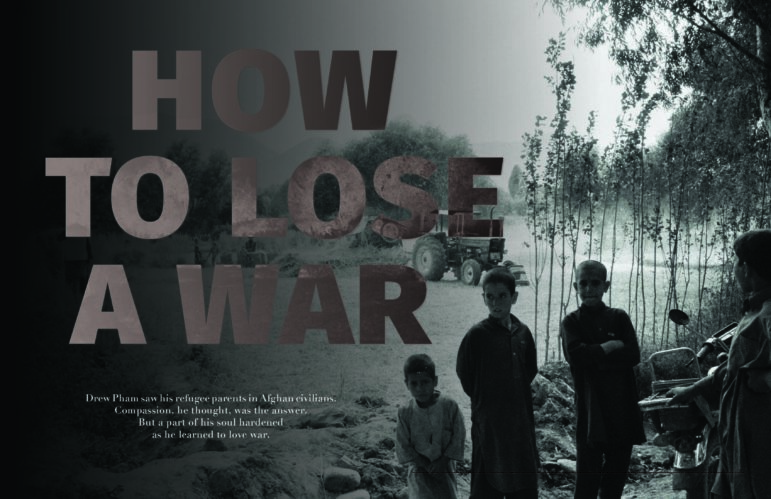
Photo: Drew Pham/The War Horse. Design by Anna Hiatt/The War Horse.
In "How to Lose a War," published by The War Horse, Drew Pham reflects on seeing his refugee parents in Afghan civilians. Compassion, he thought, was the answer. But a part of his soul hardened as he learned to love war. Read the Story »
The GroundTruth Project reported from the front lines of the war in Yemen, focusing on how women and children are disproportionately displaced, deprived and abused in a conflict led by men. Publishing with The Washington Post, the GroundTruth reporting team presented the stories of the most vulnerable victims of the four-year civil war in a series of written and video vignettes just ahead of the Senate vote to end U.S. involvement. Read the Story »
The International Consortium of Investigative Journalists’ Implant Files investigation is the first-ever global examination of the medical device industry. ICIJ worked with more than 250 journalists in 36 countries to track the harm caused by medical devices that have been tested inadequately or not at all. Read the Story »